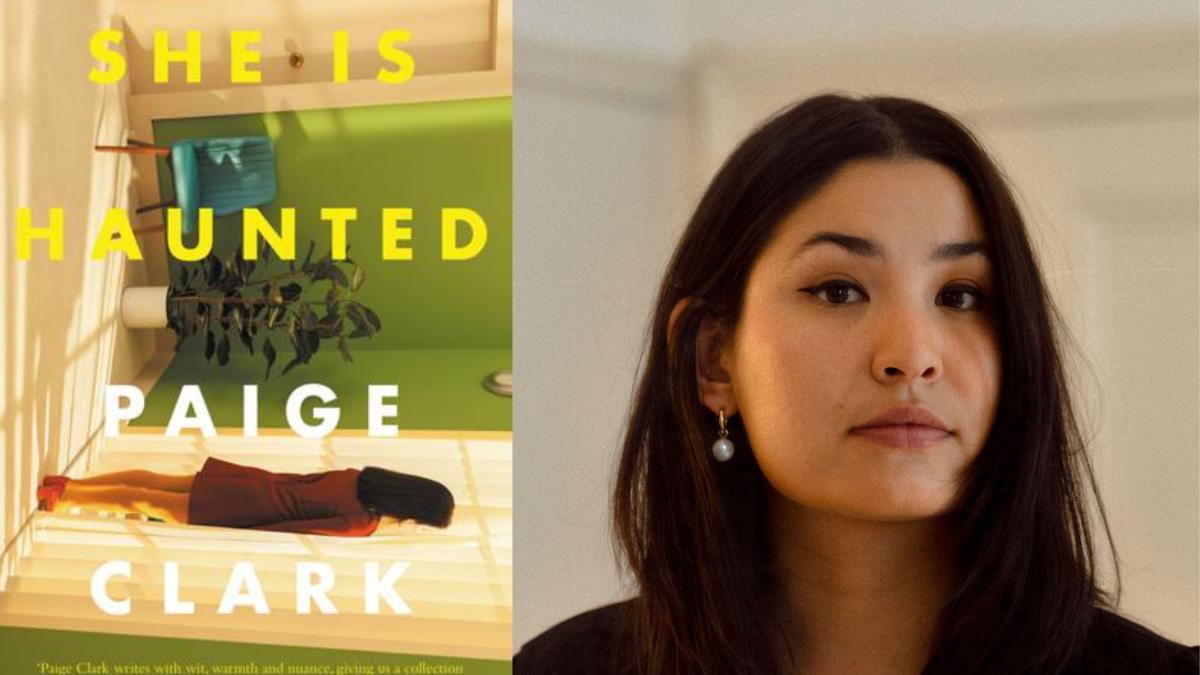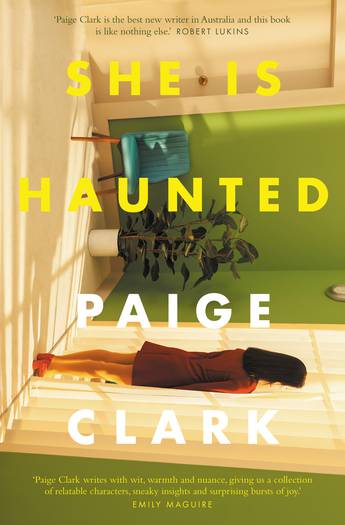
When I slap together a list of books for Litty Committee, I usually make sure to tag the author on Instagram. But I couldn’t do that with Paige Clark for her debut novel She Is Haunted, because Paige doesn’t have social media. Nada, nothing – she hasn’t had an online platform in almost four years.
Everything about She is Haunted, including Paige’s absence from social media, makes you think. The book is a collection of tender stories detailing grief, trauma, female relationships, and Paige’s Asian identity. It’s her story, fictionalised and told through the lens of many different characters.
The book synopsis reads:
“A mother cuts her daughter’s hair because her own starts falling out. A woman leaves her boyfriend because he reminds her of a corpse; another undergoes brain surgery to try to live more comfortably in higher temperatures. A widow physically transforms into her husband so that she does not have to grieve.”
PEDESTRIAN.TV spoke to Paige about her exquisite novel, from being a writer of colour to how quitting social media changed her life.
This interview has been edited and condensed for length and clarity.
PEDESTRIAN.TV: How would you describe She Is Haunted to your friends?
Paige Clark: It’s really a book about me trying to understand my life. I see each story as a letter that I’m writing to someone to try and understand either what I’ve done or what they’ve done and kind of communicate something that’s under the surface.
It’s using fiction as a way to understand the things that have happened.

PTV: What was the writing process like for you?
PC: It took me eight years to write it. I always had this idea in my head that I was a writer, but I hadn’t actually written anything. And I would kind of say to people, ‘I think I’m a writer’, and they would be like, ‘Oh, you don’t write, you keep a diary.’
And then a few things happened in my life where I just needed to make sense of something. And I just wrote a story, which is actually the last story in the book. And once I had written that story I was like, ‘Okay, this is it.’
PTV: A lot of She Is Haunted leans on your Asian identity, but you were initially told your writing wasn’t Asian enough? Can you explain that to me?
PC: Yeah, that’s so funny, because some people probably think it’s too Asian!
It’s happened with multiple different people where they were all white. I guess what happened was they would read one of the stories, like She Is Haunted, which is the title story. I think it’s a very, very Chinese story – it’s my version of being Chinese, like that story is very much about my family history, in a fictionalised sense. But I don’t think some people understood elements of it that were Chinese because it didn’t look like, you know – there were no dragons or ghosts. There weren’t things that they could relate to as part of the Chinese experience.
So that kind of advice was really about meeting the white gaze, as opposed to what my experience as a third generation Chinese-American living in Australia is.
PTV: And so, what would your advice be for writers of colour who are struggling with how much of their ethnicity they should write into a book, if that was something they wanted to do?
PC: Oh, this is such a great question, and it’s one that I have been trying to answer. The thing that I would say initially is that for other writers of colour, it’s incredibly hard because the examples that we have are so much fewer than for white writers.
Being a writer of colour is very difficult, but if you can find one or two people that write race the way you want to, that’s the starting place. So for me, it’s a matter of finding a couple of people that I’m like, ‘Okay, well that’s how they do it.’ But I think that until we have more examples, it’s always going to be difficult.
And I think that for white writers, as they start to write race themselves, it will also make it easier – not writing characters of colour, but writing their whiteness. Because it means that the narratives of a Chinese woman like myself are no longer cast on the fringe because we’re writing about race. That race just becomes something that’s part of everyone’s writing as it’s already a part of our lives.
I think that it really has to happen from both sides.

PTV: Can you tell me why you quit social media completely?
PC: Because I loved it. I was completely hooked into it. I love the internet, I love technology. I’ve always been a person who was texting – I was spending so much time on my phone. I think before I quit, I was spending eight hours a day on it, mostly on Instagram. I wasn’t a poster, I was a lurker and it just sucked up so much of my time.
The year that I quit was actually when I started to write my masters thesis [as a graduate researcher at the University of Melbourne] and I knew that I was going into this new sort of role where I had to manage my time myself, as opposed to when I was doing coursework and you have deadlines. So I just deleted my social media as an experiment for 30 days.
And once I had that time back, I just couldn’t go back. It’s coming up to four years now, and I feel like I wouldn’t have been able to achieve what I’ve achieved without that extra time.
PTV: Did it help you write?
PC: It’s helped with my writing in terms of two things. It taught me time – I wasn’t writing eight hours a day every single day, I’m not that disciplined! Maybe it would be two of those eight-hour days out of the month. But that’s still a lot – you can get a lot of work done in that time.
The second thing is the comparisons you make to other people. You see other people doing well and you feel like you’re not doing well. And if you think that person is really talented, that’s very debilitating because you think, ‘Oh, I’ll never be that talented’. And if you think that person is not very talented, then it’s equally as debilitating because you think, ‘Oh, how can that person have made it and not me?’
But really, at the end of the day, you probably haven’t put the work in, and I’m not saying that everyone that puts the work in gets a book published. But you’ve got to put the work in to have a chance, right?
I don’t think it’s a cure prescription for every writer, but that’s what it allowed me to do. It’s about finding what it is that’s holding you back.
She Is Haunted by Paige Clark is available now wherever you buy your books.
Litty Committee is Pedestrian.TV’s twice-monthly book column. Every month, we’ll take you through the newest reads and spotlight a novel we think you might like.
You can catch up on our other Litty Committee recommendations here.



